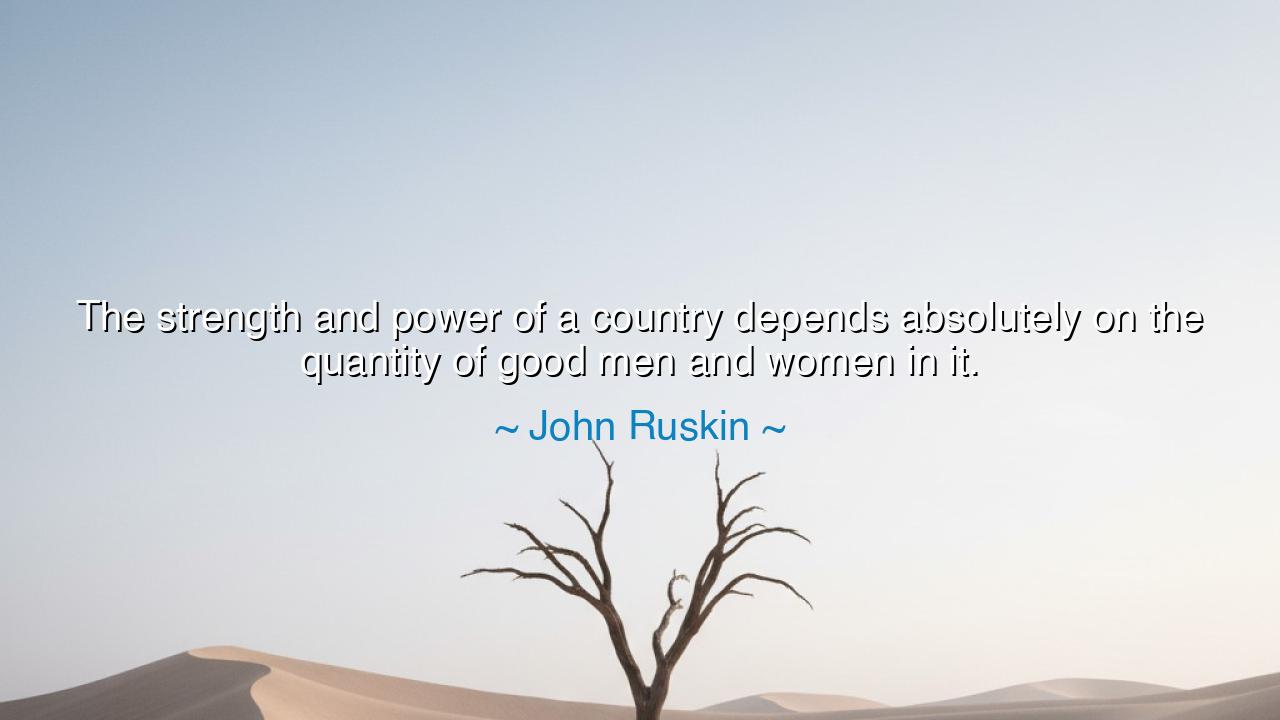
The strength and power of a country depends absolutely on the
The strength and power of a country depends absolutely on the quantity of good men and women in it.






John Ruskin, the great moralist and critic of the 19th century, once spoke words that shine like a guiding flame: “The strength and power of a country depends absolutely on the quantity of good men and women in it.” These words pierce deeper than the sword or the treasury, for they remind us that nations are not upheld by armies or by wealth, but by the character of their people. A fortress may have high walls, a kingdom may possess gold beyond measure, but without good men and women, it is already doomed to crumble.
The origin of this saying lies in Ruskin’s fierce opposition to the values of his age. He lived in a time of industrial might, when nations boasted of their machines, their empires, and their commerce. Yet Ruskin, ever the seer, looked past the smoke and iron, declaring that true greatness could not be found in factories or fleets, but in the souls of citizens. It was not the quantity of wealth but the quality of character that sustained a nation. For if greed, dishonesty, and cruelty multiplied, no empire could endure; but if honesty, justice, and courage flourished, even a small nation could shine like a star among the heavens.
The ancients knew this truth well. Sparta, mighty in arms, was feared by all Greece, yet her might was not in numbers but in the discipline of her people. Every Spartan was raised in loyalty to the state, and thus a handful of warriors could stand against legions. Likewise, Rome in her early days was not yet an empire, but her farmers, soldiers, and magistrates were bound by virtue, and so the republic grew strong. Only when corruption and luxury rotted her citizens did Rome begin to fall. Ruskin’s words echo this same eternal rhythm: the strength of a nation is the strength of its people’s virtue.
Consider too the story of George Washington. The colonies of America were small and poor compared to the wealth and armies of Britain. Yet Washington and his companions endured, not because of gold or numbers, but because enough men and women believed in justice, liberty, and sacrifice. They had no empire behind them, but they had character, and that character built a new nation. Ruskin would have nodded in recognition, for he knew that goodness is the only soil in which freedom and prosperity can take root.
And so, Ruskin’s teaching is not merely a political observation but a warning. If a people neglect the cultivation of virtue, if they train their children only in the arts of profit but not in the habits of truth, if they glorify wealth but not justice, then their strength is an illusion. A single storm of history—a war, a famine, a collapse—will expose their weakness. But if they labor to raise good men and women, the nation shall endure storms, for its foundations lie not in sand but in stone.
The lesson for us is profound: do not look to governments, armies, or markets alone for the health of a nation. Look to its homes, its schools, its families, its friendships. Look to how people treat one another in the marketplace, how they speak to the weak, how they honor truth even when it costs them dearly. If these things flourish, then the nation flourishes. If they decay, then no flag, no wealth, no conquest can save it.
So let John Ruskin’s words be carried forward as a teaching for all generations: the measure of a country’s power is not in its cannons or its coins, but in the quantity of good men and women who live within it. Therefore, cultivate goodness in yourself, in your children, in your community. Live with courage, practice justice, seek wisdom, and stand for truth. For the destiny of nations is not written only in the halls of rulers, but in the hearts of their people. And when the people are good, the nation is unshakable.






AAdministratorAdministrator
Welcome, honored guests. Please leave a comment, we will respond soon